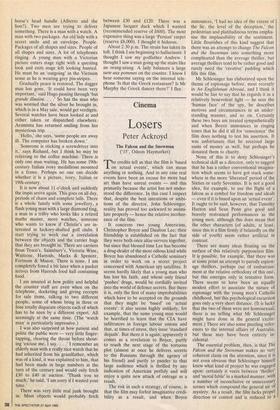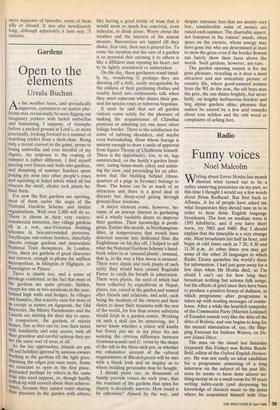Cinema
Losers
Peter Ackroyd
The credits tell us that the film is `based on actual events', which can mean anything or nothing. And in any case real events have been an excuse for more bad art than have unreal events — and this primarily because the artist has not under- stood the difference. In this case I suspect that, despite the best intentions or ambi- tions of the director, John Schlesinger, reality has proved too awkward to assimi- late properly — hence the relative incoher- ence of the film.
It concerns two young Americans, Christopher Boyce and Daulton Lee; their friendship is established on the fact that they were both once altar-servers together, but since that blessed time Lee has become a drug-dealer of the most odious kind while Boyce has abandoned a Catholic seminary in order to work on a secret project concerned with American spy satellites. It seems hardly likely that a young man who has lost his faith, and whose only friend `pushes' drugs, would be cordially invited into the world of defence secrets. But there it is, only the first of many improbabilities which have to be accepted on the grounds that they might be `based' on 'actual events': it also seems highly unlikely, for example, that the same young man would be horrified to learn that the CIA have infiltrators in foreign labour unions and that, at times of stress, they issue `standard denials'. But there it is again; apparently it comes as a revelation to Boyce, partly to reach the next stage of the tortuous plot (almost at once he delivers secrets to the Russians through the agency of his friend) and partly to pander to that large audience which is thrilled by any indication of American perfidy and will enjoy a quite new attack of outrage as a result.
The risk in such a strategy, of course, is that the film may forfeit imaginative credi- bility as a result, and when Boyce
announces, `I had no idea of the extent of the lie, the level of the deception,' the pedestrian and platitudinous terms empha- sise the implausibility of the sentiment. Little flourishes of this kind suggest that there was an attempt to change The Falcon and the Snowman into something more complicated than the average thriller, but average thrillers tend to be rather good and rarely need the `creative' padding which fills this film.
Mr Schlesinger has elaborated upon the
theme of espionage before, most recently in An Englishman Abroad, and I think it
would be fair to say that he regards it in a relatively benevolent light — he sees the `human face' of the spy, he describes motives and circumstances in an under- standing manner, and so on. Certainly these two boys are treated sympathetically and when Boyce announces, in ringing tones that he did it all for `conscience' the film does nothing to test his assertion. It was unfortunate that he received large sums of money as well, but perhaps he donated them to charity.
None of this is to deny Schlesinger's technical skill as a director, only to suggest that he has a rather conventional imagina- tion which seems to have got stuck some- where in the more `liberated' period of the Sixties or early Seventies. It is not a good
idea, for example, to use the flight of a falcon as a symbol for freedom and ideals
— even if it is based upon an `actual event'.
It ought to be said, however, that Timothy Hutton and Sean Penn give good and bravely restrained performances as the young men, although this does mean that the other characters (of adults, at least, since this is a film firmly if belatedly on the side of youth) seem rather artificial in contrast.
There are many ideas floating on the surface of this relatively purposeless film.
It is possible, for example, that there was at some point an attempt to parody espion- age thrillers, perhaps out of embarrass- ment at the relative orthodoxy of this one, but this emerges only in tentative form. There seems to have been an equally modest effort to associate the nature of espionage with the young men's Catholic childhood, but this psychological excursion goes only a very short distance. (It is lucky that the two of them were not homosexual; there is no telling what Mr Schlesinger might have done in the general excite- ment.) There are also some puzzling refer- ences to the internal affairs of Australia. but these may have been entirely in- cidental.
The essential problem, then, is that The Falcon and the Snowman makes no very coherent claim on the attention, since it Is
not even obvious that Schlesinger himself knew what kind of project he was engaged, upon: certainly it veers between `thriller' and `moral fable' in a marked manner, with a number of inconclusive or unnecessary
scenes which compound the general air of mystery. As a result, the film lacks proper direction or control and is reduced to a
mere sequence of episodes, some of them silly or absurd. It was also inordinately long, although apparently it lasts only 75 , minutes.



















































 Previous page
Previous page